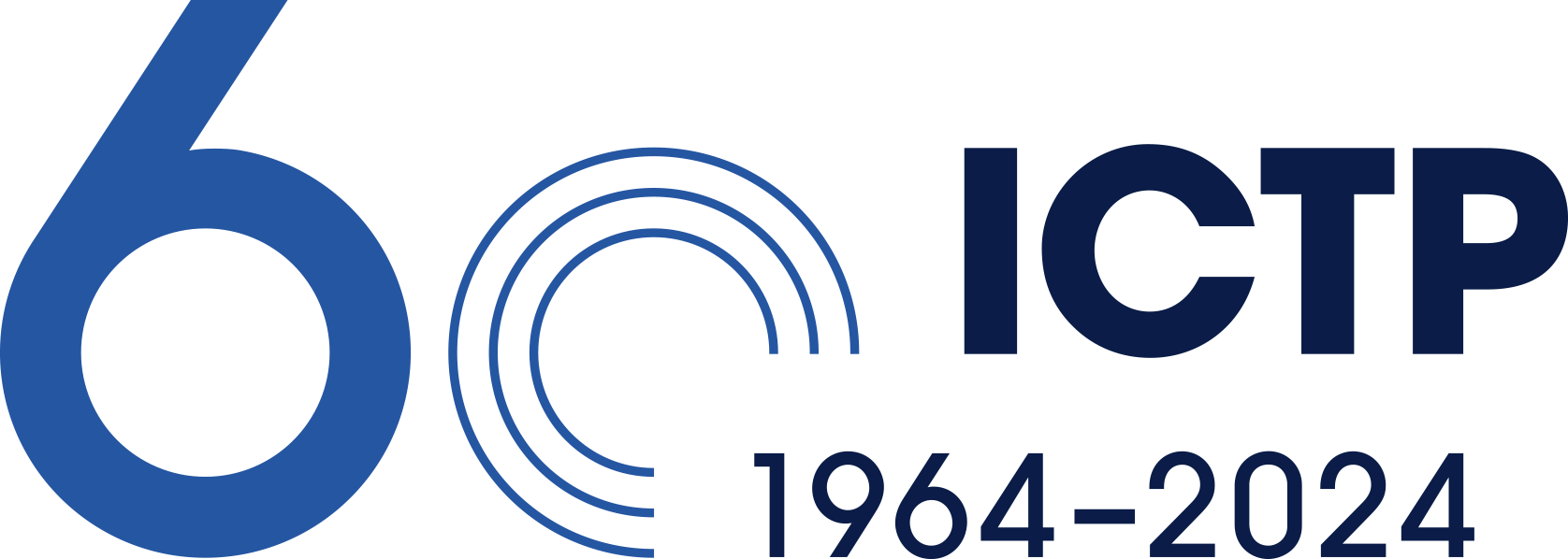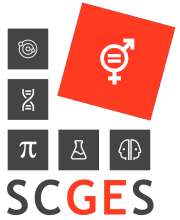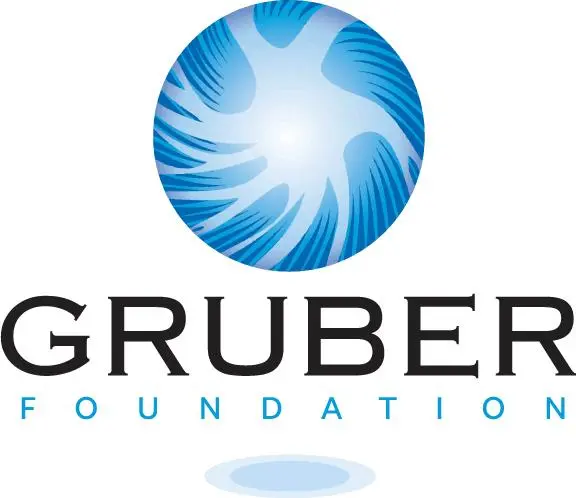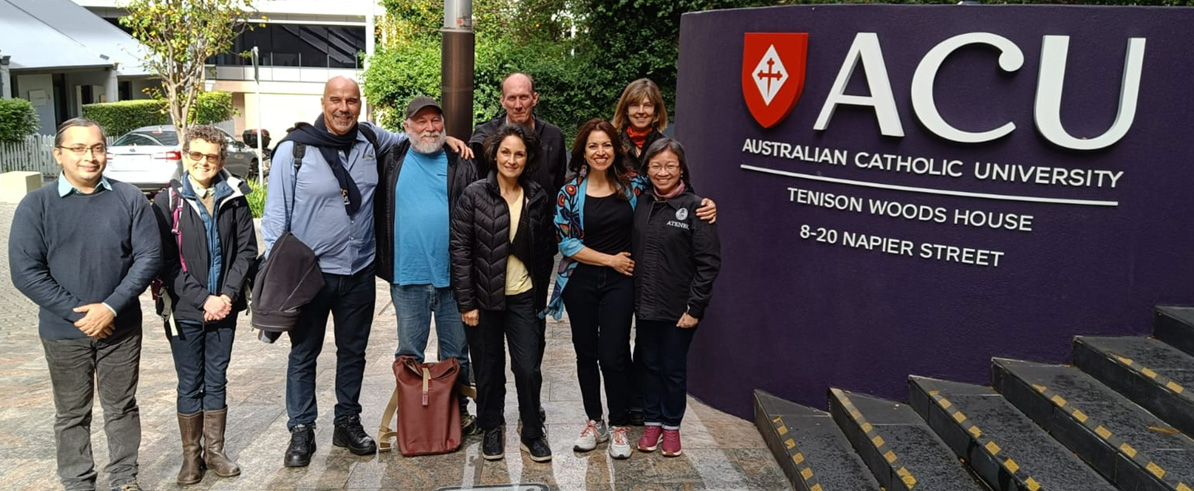IMU News 128: November 2024
A Bimonthly Email Newsletter from the International Mathematical Union (pdf)
Editor: Yoshiharu Kohayakawa, Universidade de São Paulo, Brazil
Editorial: ICTP at 60


It is a pleasure and an honour for me to write this editorial as a representative of the Mathematics Section at the Abdus Salam International Centre for Theoretical Physics, as the Centre is celebrating its 60th anniversary this year.
ICTP was founded in Trieste, Italy, by the late Nobel laureate Abdus Salam in collaboration with Italian physicist Paolo Budinich. Inspired by the conviction that science is the common heritage of humankind, Salam and Budinich put at the heart of ICTP's mission a commitment to ensuring that science develops as a truly global effort, involving researchers from around the world, regardless of the geopolitical barriers that separate them. The choice of Trieste, a strategically located city in Italy, whose history has been defined by shifting political boundaries, symbolizes ICTP’s commitment to international cooperation through science, which was reinforced when UNESCO designated ICTP as a Category I institute to build scientific capacity in developing countries.
In its 60-year history, ICTP has helped train more than 4500 students and researchers from 108 developing countries through the various training programmes and scholarships it makes available to researchers from the Global South. In addition to welcoming scientists from all over the world to its headquarters in Trieste, ICTP continuously organizes conferences and workshops in developing countries and actively collaborates with four partner institutes located in Rwanda, Mexico, Brazil and China. But ICTP is also a centre of excellence that attracts eminent scientists and develops research at the highest level. Over the years, 19 Fields medallists and 108 Nobel laureates have visited the Centre on various occasions to interact with the Centre's researchers.
From its initial focus on theoretical high energy physics, the ICTP’s research areas have evolved over the years in response to the needs of scientists from disadvantaged countries. The Mathematics Section was founded in 1986 under the guidance of James Eells, Alberto Verjovsky, and Mudumbai S. Narasimhan. In line with ICTP’s general mission, the section strives to open up opportunities for scientific talents in the developing world through a variety of programmes that are aimed at scientists at all stages of their career, starting after their graduation.
Two flagship programmes at ICTP are the Postgraduate Diploma Programme and the Associates Programme. For more than 30 years, the Postgraduate Diploma Programme has allowed students from developing countries to receive the advanced training necessary to access some of the most competitive master's and doctoral programs in the world. For us established researchers who work at ICTP there is no greater joy than to see young brilliant students grow into flourishing scientists — and over the years there have been many.
One of the most recent success stories is that of Soheyla Feyzbakhsh, a mathematics 2014 Diploma graduate who immediately after her graduation was admitted to a PhD programme at the University of Edinburgh. While there, she earned an ERC grant and won the university's Postgraduate Essay Prize and the prize for best PhD dissertation in mathematical sciences at all Scottish universities. In 2023, Feyzbakhsh received the prestigious Whitehead Prize by the London Mathematical Society and in 2024, as a senior lecturer and Royal Society University Research Fellow at Imperial College London, she was awarded the prestigious Boris Dubrovin medal by the Scuola Internazionale Superiore di Studi Avanzati (SISSA). We have just learned with great pleasure that she will share the 2025 Veblen Prize of the American Mathematical Society with R. Thomas.
The Associates Programme gives established researchers in developing countries the possibility to visit ICTP regularly and for extended periods of time, thus allowing them to take active part in the academic life of the Centre and encouraging deep scientific collaborations with the ICTP faculty.
Collaborations with mathematicians in developing countries are further developed thanks to partnerships with other institutions. In particular, we have joined forces with the UNESCO Category II centre CIMPA (Centre International de Mathématiques Pures et Appliquées) to offer grants of extended length to carry out research in pairs in any European country that is also a member of CIMPA; and with INdAM, the Italian national institute for high mathematics, to offer collaboration grants of extended length with Italian mathematicians, to be carried out at ICTP. In the past few years, our Centre has also been offering the possibility of implementing a 2-year master course in mathematics in a university in the developing world. This International Mathematical Master is fully taught by an international faculty and is currently taking place at the Lahore University of Management Studies, in Pakistan.
Over the years, the ICTP’s Mathematics Section has established strong collaborations with many developing countries. The ones with Brazil, China (as recalled by G. Tian in his editorial of the September 2020 issue of IMU News), Iran, Pakistan, Senegal and Vietnam are examples of some of the most long-standing and wide-reaching. It is through these collaborations, cultivated with regular exchanges, that ICTP can contribute to the evolution and growth of small groups of mathematicians into communities that carry out high-level research and educational programmes.
Over the past decades, the IMU has been an invaluable partner of the ICTP’s Mathematics Section. In addition to the many conferences and workshops that it has supported and various deep collaborations with the IMU Commission for Developing Countries and the IMU Committee for Women in Mathematics, the Union has been working side by side with ICTP since 2005 to award the Ramanujan Prize. Reserved to young researchers from developing countries who have conducted outstanding research in any branch of the mathematical sciences, the award is given in honour of Indian mathematician Srinivasa Ramanujan. Many of the recipients of the Ramanujan Prize have gone on to become reference figures in their research field and for their mathematical communities. Among the most recent examples, there are Carolina Araujo, researcher at the Institute for Pure and Applied Mathematics (IMPA) in Rio de Janeiro, Brazil, who received the prize in 2020, and Moustapha Mouhamed Fall, the President of the Senegalese sections of the African Institute of Mathematical Sciences (AIMS), and a former graduate of the ICTP Diploma Programme, who was awarded the Ramanujan Prize in 2022. Talking about the impact that the prize has had on his life, Fall says: “The prize has been very important for my career, and also for Senegal and for science in Africa. That the prize was awarded to an African mathematician, as it has not been the case for a very long time, showed that Africa can contribute to research in mathematics at a very high level.” The award importantly participates in IMU and ICTP’s efforts to make mathematics a truly collective enterprise: one that is made accessible to anyone who shares our passion and enthusiasm for the discipline, irrespective of their nationality and economical background. I am deeply grateful to the IMU for being our partner in this endeavour and for helping us bring forward ICTP’s mission through their support.
For further information about the ICTP’s Mathematics Section, please visit our homepage.
Standing Committee for Gender Equality in Science Fourth Annual Report published
 What is the Standing Committee for Gender Equality in Science (SCGES)?
What is the Standing Committee for Gender Equality in Science (SCGES)?
From 2017 to 2019, a number of international scientific organizations, including the IMU, took part in the project A Global Approach to the Gender Gap in Mathematical, Computing, and Natural Sciences: How to Measure It, How to Reduce It?, known as the “Gender Gap in Science Project”. The main goal of the project was to produce sound data about gender gap in science to support the choices of interventions that scientific unions could feasibly undertake. In 2020, the Gender Gap in Science Book was published, presenting the methodology, results, activities and recommendations of the project. The SCGES was formed as a follow-up to this project, reflecting a shared wish among these organizations to continue to act together to further promote gender equality in science. Its aim is to ensure liaison amongst international scientific unions to foster gender equality and the implementation of recommendations of the “Gender Gap in Science Project”.
SCGES Annual Report. The SCGES Fourth Annual Report has just been published and can be found on the SCGES website. Compiled by twenty-one of its partners, the report contains information on each union’s situation and the actions that they have undertaken regarding gender equality in the scientific discipline they represent.
Carolina Araujo and Hélène Barcelo
Chair and Vice-Chair of the IMU Committee for Women in Mathematics
Heidelberg Laureate Forum 2025

All winners of the Fields Medal, the Abel Prize, the ACM A.M. Turing Award, the Nevanlinna Prize/IMU Abacus Medal, and the ACM Prize in Computing are invited to attend the HLF. In addition, young and talented computer scientists and mathematicians are invited to apply for participation. The previous HLFs have been an exceptional success. The HLF serves as a great platform for interaction in the fields of mathematics and computer science.
Over the course of the week-long conference, young researchers are given the possibility to connect with their scientific role models and find out how the laureates made it to the top of their fields.
Applications for participation in the 12th HLF are now open in three categories: Undergraduate/Pre-Master, Graduate PhD, and PostDocs.
The deadline for application is 11 February 2025, 11:59 p.m. Berlin time. Young researchers interested in attending the 12th HLF are encouraged to check out their FAQ.
ICM 2026: Satellite conferences & events
The organizers of the 2026 International Congress of Mathematicians (ICM), on behalf of the International Mathematical Union, invite proposals for Satellite Conferences and other possible events to be associated with and complementary to ICM 2026.
Proposals for events hosted at universities, research institutes, and scientific organizations across the United States, Canada, and Mexico are welcome. Events should occur between May and September 2026 and should involve an international perspective on some aspect of the mathematical sciences with conference themes relating to the scientific areas covered by the ICM.
The application deadline is 31 December 2025. For more information, visit the ICM 2026 Satellite Conferences & Events page.
MCA 2025: Registration
The 2025 Mathematical Congress of the Americas will take place in Miami, from 21 to 25 July 2025, hosted by the Mathematics Department of the University of Miami, USA.
Registration for general participants are expected to open on 1 January 2025. Hotel reservation registration will begin 25 January 2025.
Gruber Cosmology Prize 2025
 Nominations for the 2025 Gruber Cosmology Prize are being accepted until 15 December 2024. Nominations can be submitted online.
Nominations for the 2025 Gruber Cosmology Prize are being accepted until 15 December 2024. Nominations can be submitted online.
News from the International Commission on Mathematical Instruction (ICMI)
ICMI Study 27, “Mathematics Education and the Socio-Ecological”: Update from the co-chairs
by Kate le Roux and Alf Coles
A major ICMI program is the series of ICMI Studies. This set of activities was launched in the mid-80s and has acquired growing importance and influence on the field. It contributes to a better understanding and resolution of the challenges that face multidisciplinary and culturally diverse research and development in mathematics education.
Each ICMI Study focuses on a topic or issue of prominent current interest in mathematics education. Built around an international conference, it is directed towards the preparation of a published volume intended to promote and assist discussion and action at the international, regional or institutional level. The main emphasis of a given ICMI Study may be on analytical or action-oriented aspects, but some analytical component will always be present.
The ongoing ICMI Studies can be found here, while the finalized and published studies are available here. The most recent study is ICMI Study 27, whose Conference is set to take place from 22 to 25 January 2025, in the Philippines.
Over 70 submissions, authored from 29 countries, were received for ICMI Study 27. In July 2024 the International Program Committee (IPC) reviewed most of the papers in our first in-person IPC meeting in Sydney. We are grateful to the full IPC for their reviews, prompting deep engagement with what it might mean to bring mathematics education into relation with the socio-ecological, and to Vince Geiger for organizing the productive thinking space. We also furthered the Conference program planning, including how plenaries and the Conference location itself — Ateneo de Manila University, Quezon City, Philippines — might contribute to our creative thinking about the topic.

The ICME-15 Discussion Group “Mathematics Education and the Socio-Ecological”, led by members of the IPC (and Khemduth Singh Angateeah), was a rich space to converse with a number of paper authors, the Local Organizing Committee (LOC), and others in the community. Session 1 (75 participants) and Session 2 (85 participants) confirmed the high level of interest in the topic, and gave the IPC an opportunity to collaborate on the kind of conversations we envisage for the Conference.
First, the Group explored: How are socio-ecological issues/problems forming in your local space? Which communities and territories are being affected and how? Responses gave place-based meanings to entangled ecological/environmental, social, economic and political experiences, and asymmetries in the role of humans in these entanglements. These contributions align with Study Theme B, Scales of Mathematics Education. The Group then asked: What aims does mathematics education pursue in the socio-ecological? (Theme A). Thinking about mathematics education for interrelations, community, making sense of connectivity, and balance, generated questions of: What aims for education? What mathematics? And how do we ‘know’ if re-imagined aims are realized? With the thinking prompted by Themes A and B, the Group zoomed in on Theme C, Resources of/for Mathematics Education (i.e., practices; concepts, constructs, objects; tools). Diverse notions of resources included: actions, time, cellphones, online materials, time, craft, big data, qualitative stories, home, and hope. Thus (re)turning us to issues of power, and what constitutes both mathematics and the mathematics classroom. Discussion to this point led us to think about Mathematics Education Futures (Theme D), and tensions in experiences of hope, creativity, actions, uncertainties, fears, helplessness, and violences; and opportunities for mathematics (education) to (re)story futures.
News from the Commission for Developing Countries (CDC)
 The next International Congress of Mathematicians will take place in Philadelphia, USA, from 23 to 30 July 2026. The call for applications for the ICM 2026 Travel Support Program, which provides financial support to mathematicians from eligible developing countries to attend, is now closed. The program received an impressive number of applications from across all continents. Applicants will be notified of the results in the spring of 2025.
The next International Congress of Mathematicians will take place in Philadelphia, USA, from 23 to 30 July 2026. The call for applications for the ICM 2026 Travel Support Program, which provides financial support to mathematicians from eligible developing countries to attend, is now closed. The program received an impressive number of applications from across all continents. Applicants will be notified of the results in the spring of 2025.
We would also like to remind you about our new IMU-Simons Research Fellowship Program for Developing Countries, generously funded by the Simons Foundation. This new grant program supports mathematicians based in developing countries in undertaking collaborative research at mathematical institutions abroad. The CDC strongly encourages mathematicians and students from developing countries to apply to our calls listed below and to contact us for further details via email.
Grants for Institutions
- Volunteer Lecturer Program (next deadline December 1, 2024, for courses to be held between June 1, 2025, and June 1, 2026)
- Library Assistance Scheme (no fixed deadline)
Grants for Conferences and Projects
- Conference Support Program (next deadline January 15, 2025, for conferences starting after May 15, 2025)
Grants to Individuals
- Abel Visiting Scholar Program (next deadline December 31, 2024, for research visits between May 1 and August 31, 2025)
- IMU-Simons Research Fellowship Program for Developing Countries (next deadline January 15, 2025, for research visits starting between June 1, 2025, and June 1, 2026)
Graduate Scholarships
- IMU Breakout Graduate Fellowship Program (the 2025 call for nomination will open no later than March 1, 2025)
- Graduate Research Assistantships in Developing Countries (GRAID) Program (the 2025 call for applications will open in early 2025 with deadline on March 15, 2025)
News from the Committee for Women in Mathematics (CWM)
 CWM 2025 Call is now open. The IMU Committee for Women in Mathematics (CWM) invites proposals for funding of up to €3000 for activities or initiatives to support women in mathematics taking place from March 2025 to February 2026. Applications should be submitted by December 13, 2024 (by 23:59 CET), via the IMU Grants homepage. They should aim at one of the following:
CWM 2025 Call is now open. The IMU Committee for Women in Mathematics (CWM) invites proposals for funding of up to €3000 for activities or initiatives to support women in mathematics taking place from March 2025 to February 2026. Applications should be submitted by December 13, 2024 (by 23:59 CET), via the IMU Grants homepage. They should aim at one of the following:
- Establishing or supporting networks for women in mathematics, preferably at the continental or regional level.
- Organizing research workshops geared towards establishing research networks for women in mathematics.
- Other ideas for researching and/or addressing issues encountered by women in mathematics.
Each applicant may submit only one proposal for the call. There will be no other CWM call for applications regarding activities in 2025. Successful applicants will be informed no later than January 31, 2025.
The CWM hosted an online webinar about the CWM Call 2025 on November 27, 2024. For more information, please read the call here.
Women scientists around the world: strategies for gender equality. The Standing Committee for Gender Equality in Science (SCGES) has launched the new project “Women scientists around the world: strategies for gender equality”. Joint with the International Science Council (ISC), the project consists of a series of articles, based on interviews with women scientists from various disciplines and geographic regions, several of whom have attained leadership roles in scientific organizations. It explores the drivers and barriers to gender representation in scientific organizations, aiming to document from a qualitative point of view the obstacles to gender equality in science, and the strategies developed to reach it.
The first article gives voice to Dr. Encieh Erfani, an Iranian physicist specialized in cosmology and ISC Fellow, who resigned from her academic position in Iran in 2022 as a protest in honor of Mahsa Amini, a young woman who died in custody after being detained for allegedly violating Iran’s compulsory hijab law: In the face of gender apartheid: Dr. Erfani’s path.
The second piece is devoted to former CWM member Marie Françoise Ouedraogo. She was the first woman in Burkina Faso to earn a PhD in mathematics, and founded the Association of Women in Mathematics in Africa (AWMA) in 2013: From pioneer to leader: Paving the way for African women in mathematics.
The third article in the series is based on an interview with Bolivian biologist Mónica Moraes. She was the first woman President of the Bolivian Academy of Sciences, from 2021 to 2024, breaking the culture of silence and redefining institutional practices: Transforming science organizations: The impact of women’s leadership on institutional reform.
Carolina Araujo and Hélène Barcelo
Chair and Vice-Chair of the IMU Committee for Women in Mathematics
News from the International Day of Mathematics (IDM)
The next IDM will take place on March 14, 2025, under the theme Mathematics, Art, and Creativity.
IDM 2025 School Program. The IDM School Program connects schools worldwide for several weeks before the International Day of Mathematics (IDM), on March 14, 2025. School teachers for students ages 10–18 are invited to join a free virtual workshop (available in English, French, Spanish, and Portuguese) presenting ideas for activities related to this year’s theme, Mathematics, Art, and Creativity. Afterward, they can join a group chat to collaborate, exchange ideas, and share experiences with other teachers from different countries who share their language.
Workshops will take place on the following dates:
- 1st English workshop: Monday, December 9, 2024, 8:00 UTC
- Spanish workshop: Tuesday, December 10, 2024, 15:00 UTC
- 2nd English workshop: Wednesday, December 11, 2024, 21:00 UTC
- French workshop: Thursday, December 12, 2024, 15:00 UTC
- Portuguese workshop: January or February 2025
Limited spots are available. The deadline for applying is December 4, 2024. To learn more and access the application form, download an information sheet in any of the following languages:
Coming soon. From December on, we will start posting:
- The 2025 IDM interactive event map, where everyone organizing a celebration is invited to post their event.
- A new creative challenge, to team up and share your ideas with the world.
- A new poster, with this year’s theme: Mathematics, Art, and Creativity.
- New activities to be done in the classroom.
Christiane Rousseau
Chair of the IDM Governing Board
IMU Bulletin no. 75: IMU activities in 2023
IMU Bulletin No. 75, reporting on the IMU activities in 2023, is now available on the IMU Bulletins page of the IMU website.
Subscribing to IMU News
To subscribe to IMU News, please click here. When you subscribe, you will receive an e-mail message to confirm your subscription so that misuse will be minimized.
IMU will not use the list of IMU News emails for any purpose other than sending IMU News, and will not make it available to others.
Previous issues can be seen here.
